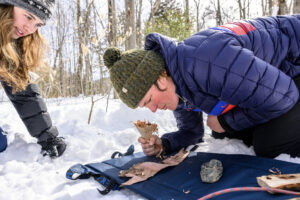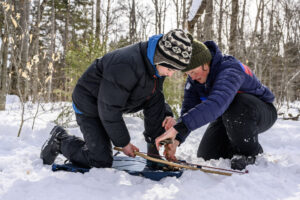I often hear students compare themselves to their peers. It sounds like, “I went so slow in Trailhead phase” or “Jesse is better at bow drilling than me. They’ve already busted a coal.” Or I hear something along the lines of “Harlow never asks for breaks on hikes, and he doesn’t have any issue carrying his pack.” To compare is to consider the similarities or differences between two things or people. However, we often go beyond identifying a similarity or difference between ourselves and others and begin to assign value based on those differences. Comparison quickly escalates from holding two people as they are in their similarities and differences, to holding one over the other with the intention to determine the fastest, strongest, the best, the most successful.
As a therapist, when I hear a comparison, a therapeutic flag is raised signaling that this student has deeper needs to be attended to.
Meaning exists in the comparisons we make. There are beliefs and internal narratives that are unspoken and simmering just beneath comparative statements. Comparison makes our differences divisive, creating a hierarchy that determines who is better. From hierarchy can derive value; those closer to being “the fastest” or “the strongest” are perceived as more valuable human beings. And the moment we begin to assign value from our comparisons, we begin to put conditions on our own worthiness.

Let’s take my student Lee*. Lee is currently in Camp One (the third phase of True North) and working on their bow drill set. They have been in the program about two months which at this point, is longer than some of their peers who are also in Camp One phase. Lee is creative, artistic, and their therapeutic work has focused on learning emotional communication skills. The wilderness skills have challenged Lee. They struggle to be organized and can easily lose their belongings. Lee is also learning to be connected to their body, and bow drilling requires fine and gross motor skills.
Lee is often comparing themselves to their peer Jesse who is in their eighth week and in Camp One as well. The wilderness skills have been easy for Jesse to pick up, who’s spent a lot of time outdoors and played hand-eye-coordination sports most of their life. While Jesse picks up the physical skills pretty easily, they have a low frustration tolerance and struggle to open up about their emotions with their peers. Jesse often puts on a stoic demeanor to avoid sharing their emotions, and then feels disconnected from their peers.
Comparison gets the best of Lee. When Lee looks at Jesse, all Lee sees is Jesse’s bow drilling skill, and that “Jesse is better at bow drilling than me, they’ve already busted a coal.” In this comparative statement, Lee has created a hierarchy based on one difference between themself and Jesse. At the top is busting a coal and blowing it to flame from your own bow drill set. Under this hierarchy, this one skill marks a person’s entire success and accomplishment. Value is then assigned to people based on how close they are to the top of the hierarchy. The definition of success becomes narrow and the potential for failure widens. What Lee sees is that Jesse is at the top of the hierarchy, and they are not; Jesse has succeeded, and they have failed.
Pause. This is the therapeutic moment to slow down, unpack, disrupt, and rethink our interpretations.
With Lee, the work is to interrogate the hierarchy that’s been created. How is success defined and how is success measured? Who is defining success? If we let go of this hierarchy, what might we learn from our differences?
 When two things or people are compared and then pinned against one another in a hierarchical manner, it creates a single definition of success and in doing so, we lose context of a situation, or nuance and complexity of an individual. Bow drilling is a skill. It is not a measure of success but a point of progress on a student’s learning curve. Instead of deriving value from who has busted a coal and who has not, let’s recognize the similarities and differences between peers and ask how Lee could learn from Jesse. Instead of Jesse being Lee’s competitor or marker of failure, Jesse could be Lee’s collaborator, problem solver, or cheerleader. Instead of deriving value from who busted a coal and who has not, let’s recognize the similarities and differences within an individual. Today Lee is taking runs on their bow drill set and managing feelings of frustration that they are getting smoke but no coal. Let’s spotlight that! Two weeks ago, Lee would have procrastinated bow drilling most of the day because they were afraid to ask for help. Two months ago, Lee would have avoided the task all together because it was intimidating, and they feared any potential failure.
When two things or people are compared and then pinned against one another in a hierarchical manner, it creates a single definition of success and in doing so, we lose context of a situation, or nuance and complexity of an individual. Bow drilling is a skill. It is not a measure of success but a point of progress on a student’s learning curve. Instead of deriving value from who has busted a coal and who has not, let’s recognize the similarities and differences between peers and ask how Lee could learn from Jesse. Instead of Jesse being Lee’s competitor or marker of failure, Jesse could be Lee’s collaborator, problem solver, or cheerleader. Instead of deriving value from who busted a coal and who has not, let’s recognize the similarities and differences within an individual. Today Lee is taking runs on their bow drill set and managing feelings of frustration that they are getting smoke but no coal. Let’s spotlight that! Two weeks ago, Lee would have procrastinated bow drilling most of the day because they were afraid to ask for help. Two months ago, Lee would have avoided the task all together because it was intimidating, and they feared any potential failure.
Interrogating the hierarchy that is built from a comparison can shift perspective to spotlight and celebrate growth in others and in oneself. Letting go of hierarchy and simply recognizing differences between two students can create the possibility to feel joy for a peer who busted a coal, rather than contempt. Recognizing similarities and differences in oneself over time is a powerful reflection tool that can expose learning style, emotional regulation skills, or resilience. Slowing down comparisons can help dismantle the conditions we put on our self-worth. And in turn, remind a student that they are worthy simply because they exist.
*Student names and information has been changed to maintain student confidentiality.


